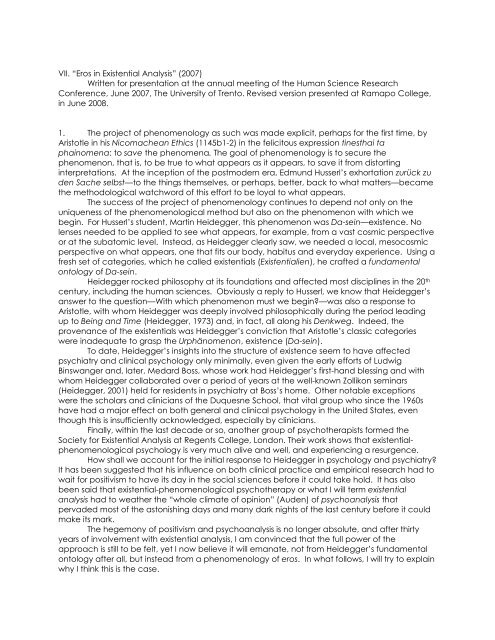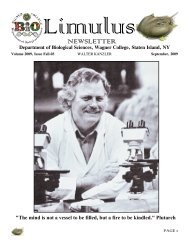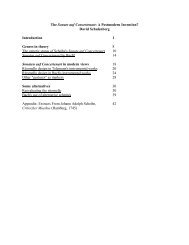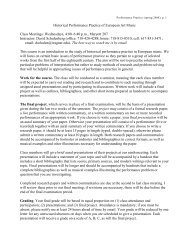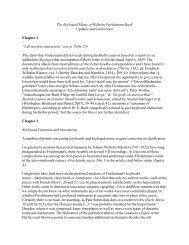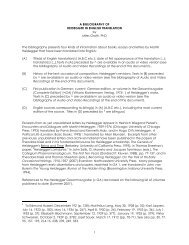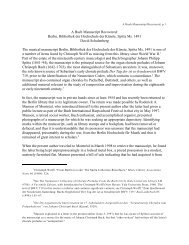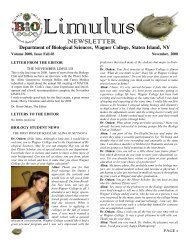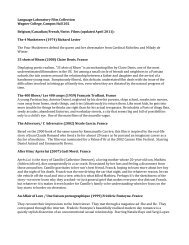SEVEN PAPERS ON EXISTENTIAL ANALYSIS ... - Wagner College
SEVEN PAPERS ON EXISTENTIAL ANALYSIS ... - Wagner College
SEVEN PAPERS ON EXISTENTIAL ANALYSIS ... - Wagner College
You also want an ePaper? Increase the reach of your titles
YUMPU automatically turns print PDFs into web optimized ePapers that Google loves.
VII. “Eros in Existential Analysis” (2007)<br />
Written for presentation at the annual meeting of the Human Science Research<br />
Conference, June 2007, The University of Trento. Revised version presented at Ramapo <strong>College</strong>,<br />
in June 2008.<br />
1. The project of phenomenology as such was made explicit, perhaps for the first time, by<br />
Aristotle in his Nicomachean Ethics (1145b1-2) in the felicitous expression tinesthai ta<br />
phainomena: to save the phenomena. The goal of phenomenology is to secure the<br />
phenomenon, that is, to be true to what appears as it appears, to save it from distorting<br />
interpretations. At the inception of the postmodern era, Edmund Husserl’s exhortation zurück zu<br />
den Sache selbst—to the things themselves, or perhaps, better, back to what matters—became<br />
the methodological watchword of this effort to be loyal to what appears.<br />
The success of the project of phenomenology continues to depend not only on the<br />
uniqueness of the phenomenological method but also on the phenomenon with which we<br />
begin. For Husserl’s student, Martin Heidegger, this phenomenon was Da-sein—existence. No<br />
lenses needed to be applied to see what appears, for example, from a vast cosmic perspective<br />
or at the subatomic level. Instead, as Heidegger clearly saw, we needed a local, mesocosmic<br />
perspective on what appears, one that fits our body, habitus and everyday experience. Using a<br />
fresh set of categories, which he called existentials (Existentialien), he crafted a fundamental<br />
ontology of Da-sein.<br />
Heidegger rocked philosophy at its foundations and affected most disciplines in the 20 th<br />
century, including the human sciences. Obviously a reply to Husserl, we know that Heidegger’s<br />
answer to the question—With which phenomenon must we begin?—was also a response to<br />
Aristotle, with whom Heidegger was deeply involved philosophically during the period leading<br />
up to Being and Time (Heidegger, 1973) and, in fact, all along his Denkweg. Indeed, the<br />
provenance of the existentials was Heidegger’s conviction that Aristotle’s classic categories<br />
were inadequate to grasp the Urphänomenon, existence (Da-sein).<br />
To date, Heidegger’s insights into the structure of existence seem to have affected<br />
psychiatry and clinical psychology only minimally, even given the early efforts of Ludwig<br />
Binswanger and, later, Medard Boss, whose work had Heidegger’s first-hand blessing and with<br />
whom Heidegger collaborated over a period of years at the well-known Zollikon seminars<br />
(Heidegger, 2001) held for residents in psychiatry at Boss’s home. Other notable exceptions<br />
were the scholars and clinicians of the Duquesne School, that vital group who since the 1960s<br />
have had a major effect on both general and clinical psychology in the United States, even<br />
though this is insufficiently acknowledged, especially by clinicians.<br />
Finally, within the last decade or so, another group of psychotherapists formed the<br />
Society for Existential Analysis at Regents <strong>College</strong>, London. Their work shows that existentialphenomenological<br />
psychology is very much alive and well, and experiencing a resurgence.<br />
How shall we account for the initial response to Heidegger in psychology and psychiatry?<br />
It has been suggested that his influence on both clinical practice and empirical research had to<br />
wait for positivism to have its day in the social sciences before it could take hold. It has also<br />
been said that existential-phenomenological psychotherapy or what I will term existential<br />
analysis had to weather the “whole climate of opinion” (Auden) of psychoanalysis that<br />
pervaded most of the astonishing days and many dark nights of the last century before it could<br />
make its mark.<br />
The hegemony of positivism and psychoanalysis is no longer absolute, and after thirty<br />
years of involvement with existential analysis, I am convinced that the full power of the<br />
approach is still to be felt, yet I now believe it will emanate, not from Heidegger’s fundamental<br />
ontology after all, but instead from a phenomenology of eros. In what follows, I will try to explain<br />
why I think this is the case.


